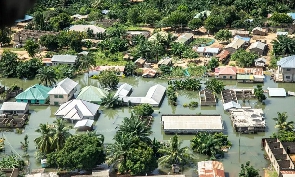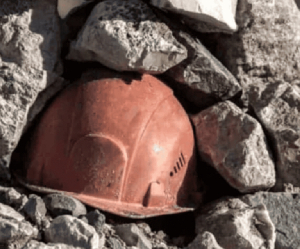A witty, proverbial line from the lyrics of a highlife hit song came to mind a few days ago when I heard on radio, a passionate plea for fair distribution of the humanitarian supplies for victims of the Akosombo dam spillage.
The lyrics of maestro A B Crentsil’s song titled ‘Bribi Dzim’, include a quip about how when seven people were to share 7000, one of the seven went home empty-handed!
Speaking in a Radio Ghana interview, an unnamed community leader complained emotionally that although his community has been hearing about donations meant for all those affected by the disaster, they were yet to see any of the items.
‘Bribi Dzim’ in the Fante language (meaning ‘something is blocking it’), acquired fame particularly from the witticism which translates as: “My pal Joojo tells the story of how seven people shared a sum of seven thousand, but one of them didn’t get a share.”
If seven people are to share a quantity of seven, then one expects that each will get one portion, so how can one explain “the mystery”, as a friend put it, of one of the seven not getting anything at all?
I’m not quoting the line because of its humour. To me, what is more relevant here is its pithy reminder that in human relations, where material possessions are concerned there can be uncertain outcomes. How is it that some of the spillage victims have allegedly been left out of the distribution of the relief goods?
After all, they are all victims of the unprecedented national emergency, the monumental displacements and misery arising from the “controlled spilling” from the Akosombo and Kpong dams by the Volta River Authority. It started on September 15, 2023, and has resulted in devastating flooding in many places, in the Volta and Eastern regions, notably North, South, and Central Tongu districts, as well as Ada East District. The number of victims is now estimated at a staggering 40,000.
Heavy rainfall in the Volta River catchment, the VRA has explained, resulted in the fast rise in the water of the Akosombo Dam, threatening to exceed the dam’s maximum operating level of 276 feet. Therefore, it was necessary to spill the excess water in order to protect the dam, which reportedly provides some 85 percent of the country's electricity.
It has emerged that other places affected include the Bono East Region. The Daily Graphic of October 23 reported that more than 2000 people have been rendered homeless in 15 communities in the Pru East District. Assemblymember, Godwin Awudu, stated in a radio interview in Sunyani, that reports to the National Disaster Management Organisation (NADMO) had not received any response.
Ghana Television news of Monday, October 23, confirmed that indeed all is not well with the distribution. Angry, frustrated-sounding people of Mepe, reportedly the hardest-hit community, complained bitterly that the handling of the distribution was not at all satisfactory. They went as far as accusing some community leaders of “hoarding” the donated goods; and that although some non-victims were getting some of the items, some of those in critical need had been left out.
Similarly, on October 23, a GNA report quoted the President of the Volta Region House of Chiefs, Togbe Tepre Hodo IV, as expressing serious concern about the way the distribution is being done. The Regional House itself has launched a disaster relief fund for the victims.
Commendably, in addition to the Inter-Ministerial Committee already set up by the Government, on Tuesday, Deputy Information Minister Ms. Fatimatu Abubakar announced the establishment of “a National Emergency Contact Centre to respond to calls from individuals and communities affected by the dam spillage as part of the Government’s relief efforts.”
People who need urgent support are to dial short code 311 on all phone networks for assistance.
However, although there are reports of many donations from organisations and individuals, there seems to be no coordinating office. If one has already been set up, then this information needs to be well publicised.
I have been wondering why with so many donations coming in, there seems to be no central organisation. It seems others, too, share this concern, one of them being the Member of Parliament for Asuogyaman, Thomas Ampem Nyarko. Mr. Nyarko has reportedly called on the Government to centralise the distribution.
I see the immediate need for a dedicated office for that purpose. It could even be a unit of the NADMO, taking charge solely of receiving donations and the distribution. Most critical of all, if not already done, there should be a compilation of all the affected communities, donations delivered, and those yet to be served so that no one is left out.
From past experience, we know that Ghanaians respond well to appeals for humanitarian support in such emergencies, and this is borne out now by the regular media reports of donations. Members of Parliament from the area, too, have been working hard to help the victims.
Even media houses have gone beyond merely covering the news, to offering practical help, by collecting donations: Ghana Broadcasting Corporation has launched a ‘GBC Cares/GTV Cares’; and CitiFM/CitiTV has launched not only a ‘#Relief4Lower Volta’, but, impressively, have also started building resettlement centres for the victims.
Apart from the encouraging, countless reports of donations, the variety of goods is also worth commenting on: food items, such as rice, sugar, garri, and cooking oils; water; toiletries; sanitary towels; soft drinks; mattresses; clothes and shoes; cooked food; cooking utensils; mosquito nets and repellents; solar lanterns and coal pots.
Nevertheless, something appears to be missing: it seems that there is not yet any news about donations of charcoal; or gas or kerosene stoves. Yet, these may be part of the essential needs to be met because wood for cooking may be in short supply, given the waterlogged situation.
Hopefully, the donations will keep flowing in, so, in view of the emerging complaints, there is a need for a coordinating office or system.
This is not to question the integrity of anybody, but the complaints and pleas for fair distribution point to an urgent need. Nothing should be taken for granted. Bad behaviour can happen in any situation. One example is the recurrent news in the media about even school feeding supplies in some institutions being diverted for personal benefit.
Again, a centralised system will make for transparency, efficiency, clear any misconceptions, and likely attract more of the compassion and goodwill people are so beautifully demonstrate.
Moreover, when life returns to normal, there has to be a readily available record of who gave what, a documented list of the gratifying illustration of this touching aspect of the famous ‘Ghanaian hospitality’.
Incidentally, ‘Bribi Dzim’ is also a song of commiseration. It begins with a statement in Fante that translates as “life’s issues can be traumatic” adding the now much-quoted expression ‘go to check up’: “if one tug at a rope and it doesn’t move/yield, it means something is blocking it”, advising in English, “so go to check up … (but) don’t weep; it shall be well.”
(The track, ‘Bribi Dzim’, is from the 1985 album ‘Toronto by Night’. Sadly, Alfred Benjamin Crentsil died on July 13, 2022.)
ajoayeboahafari@yahoo.com
Opinions of Thursday, 26 October 2023
Columnist: Ajoa Yeboah-Afari















